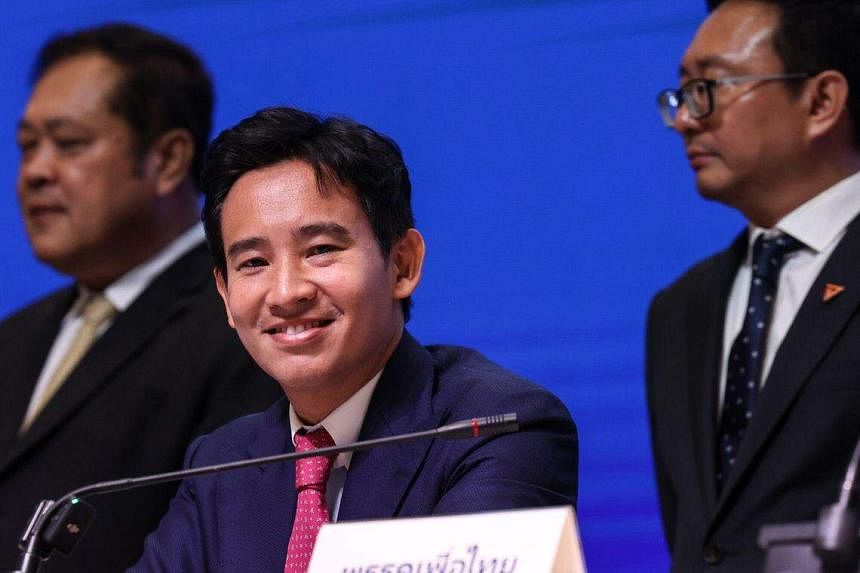BANGKOK - Thailand’s election winner Move Forward Party (MFP) has set up a transition team with its coalition partners to facilitate the handover from the previous government, even as negotiations over key Cabinet roles continue.
The eight-party bloc, which collectively supports MFP leader Pita Limjaroenrat for prime minister, has also established several working groups to tackle urgent issues during the transition period, including high energy prices, the unrest in Thailand’s deep South and environmental problems.
Speaking to the media on Tuesday after a coalition meeting, Mr Pita said: “The objective of today’s meeting is to make sure we have a roadmap until the day I become prime minister.
“During this transition period, many people have been demanding answers, so we hope that by consolidating and setting up working committees, we can provide some answers.”
The transition team, led by Mr Pita, and the working groups, will comprise representatives from the eight parties that make up the anti-junta coalition.
Who gets the role of House Speaker of Parliament is yet to be determined, after a public row last week between the MFP and coalition ally Pheu Thai, with each insisting its party take the position.
Mr Pita said the two parties will continue to discuss the matter, with a decision coming at a later date.
“I don’t think it will be an obstacle in forming the government... We are prepared to be the government for the people and that is more important.”
The MFP, which won 151 seats at the May 14 election, is in the process of establishing a 312-member coalition with the Pheu Thai Party, which got 141 seats, and six other allied parties with a combined 20 seats, to form the government.
The bloc had earlier this month signed a memorandum of understanding that pledged to reform the military, police and civil service, rewrite the Constitution, relist cannabis as a narcotic meant only for medical use, and recognise same-sex marriages.
On Tuesday, Pheu Thai party leader Cholnan Srikaew said the two major coalition allies must work together to build a democratic government.
“Our ties are strong and we will stick together no matter what happens,” said Mr Cholnan, who in a show of solidarity turned to Mr Pita and shook his hand during a press conference chaired by coalition party leaders.
The tussle over the post of Speaker, who presides over Parliament and sets meeting agendas, fuelled speculation that the coalition could collapse and highlighted the fragility of the alliance.
Election runner-up Pheu Thai, which had been expected to win the election, has been fighting off rumours that it is pursuing a secret deal to join an alternative alliance with former government parties, such as the Bhumjaithai and Palang Pracharath, that leaves the MFP out of the grouping.
An encounter between Pheu Thai prime ministerial candidate Srettha Thavisin and Bhumjaithai leader Anutin Charnvirakul at a football game in England over the weekend further fanned these flames.
Both men said it was a chance meeting.
On Tuesday, caretaker PM Prayut Chan-o-cha, whose United Thai Nation Party won 36 seats in the election, told local media that he has already instructed ministries to compile reports to ease the transition to the next government. But he said it would be “inappropriate” for the alliance’s transition team to approach government agencies for information, as the caretaker administration is still in place.
The Election Commission still has to certify the election results, after which Parliament will convene to choose the House Speaker before voting on the PM.
Even with the support of an alliance with a majority of seats in the Lower House, securing the top job is not a sure thing for Mr Pita.
The MFP’s 312-seat coalition must gather support from more than half of the 750-member Parliament for Mr Pita to lead the government. This means the alliance will need at least 64 more votes from either the junta-appointed 250-member Senate or MPs from parties outside the coalition.
Several senators have already voiced their opposition to Mr Pita becoming prime minister, citing the MFP’s intention to amend the lese majeste law that protects the monarchy from insult.
The MFP said it currently has the backing of nearly 20 senators.
Mr Pita also faces a potential investigation regarding his ownership of shares in a defunct media company.
If the authorities pursue the case and find him guilty, it could result in his retroactive disqualification from the election.


